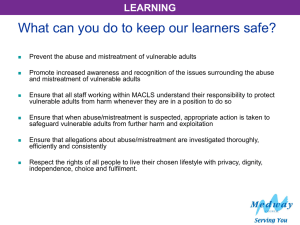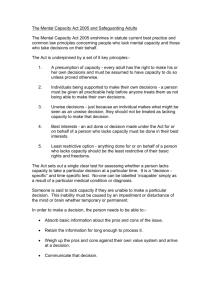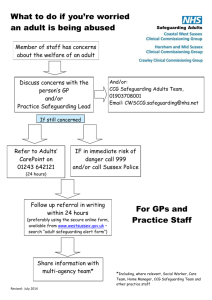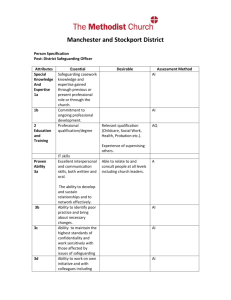Safeguarding course powerpoint
advertisement
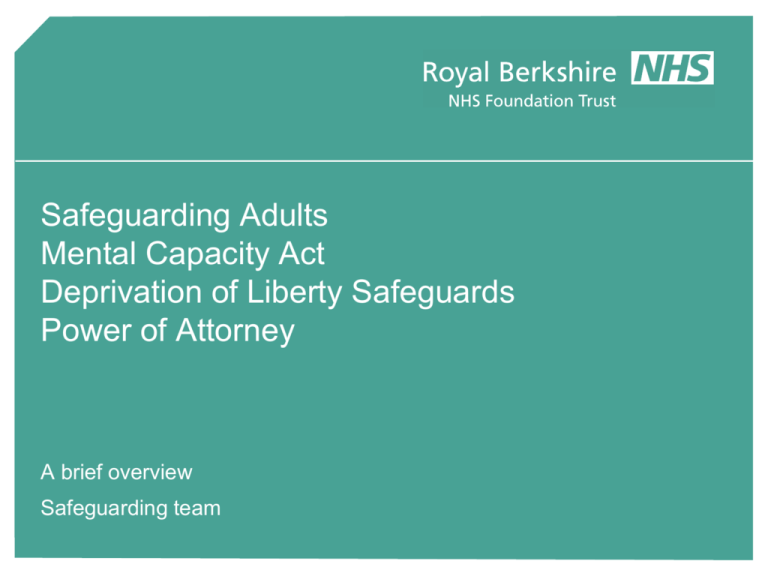
Safeguarding Adults Mental Capacity Act Deprivation of Liberty Safeguards Power of Attorney A brief overview Safeguarding team Safeguarding Vulnerable Adults from Abuse Safeguarding Adults is: all work which enables vulnerable adults to retain independence, well being and choice and to be able to live a life free from abuse and neglect preventing abuse and neglect as well as promoting good practice for responding to concerns on a multi-agency basis 2 Who are Vulnerable Adults? Those aged 18 or over Who “is or maybe eligible for community care services” those whose independence and well being would be at risk is they did not receive appropriate support and who may be at risk of abuse or neglect” Includes adults with physical, sensory and mental impairments and learning disabilities Source – Berkshire Safeguarding Adults Policy & Procedures 2008 in line with No Secrets. Department of Health, 2000 berksadultsg.proceduresonline.com/index.htm 3 Indicators of Abuse The following may indicate abuse: Seeking shelter or protection. Unexplained reactions towards particular individuals. Unexplained reactions to particular settings. Frequent visits to GP, hospital casualty or hospital admissions. Frequent or irrational refusal to accept investigations or treatments. Unexplained change in material circumstances. Inconsistency of explanation. 4 Risk Indicators Destruction of physical environment Turning night into day - sleep disturbance Chronic incontinence Extreme physical and/or emotional dependence Verbal abuse and/or aggression towards carer Changes in personality Wandering/absconding Self harm 5 Reporting and Recording Concerns about abuse must be reported and recorded on the same day, or as soon as possible. What you saw if you witnessed the abuse What was said, use exact words where possible Information on the setting Describe any significant points about adult’s appearance and emotional presentation Use a body map as necessary Separate factual information from your opinion Who the concerns were reported to (Police?) Any decisions as a result of these contacts 6 How to Report Where the alleged abuse happened is important information. This will guide you as to which Local Authority Safeguarding Team to report to. The Local Authority where the abuse is alleged to have happened is responsible for leading the investigation. Make yourself aware of who your local safeguarding adults team is and how to contact them. Reading – 0118 9374747 (Main contact number for Adult Social Care) or safeguarding.adults@reading.gov.uk Mental Capacity Act 2005 Framework to protect those who lack capacity. To enable people to take part, as much as possible in decisions that affect them. Includes five statutory principles. For people 16 years and over. http://www.legislation.gov.uk/u kpga/2005/9/contents www.scie.org.uk/publications/ ataglance/ataglance05.asp 5 Principles 1. You must always assume the person has capacity, unless proved otherwise 2. You must take all practicable steps to enable people to make their own decisions 3. You must not assume incapacity simply because someone makes an unwise decision 4. Always act or decide, for a person without capacity, in their best interest 5. Carefully consider your actions to ensure the least restrictive option is taken Mental capacity Remember: Mental capacity is decision and time specific So you cannot just say/document “……lacks mental capacity” You will need to document “….. lacks mental capacity in relation to…” e.g. care and/or treatment, managing finances, leaving the hospital, discharge planning. Accurate documentation is required throughout to support your assessment and any decisions made thereafter. Mental Capacity is not a (Mini) mental assessment/score GCS Related to age, appearance or medical condition Assessment of Capacity - two stage test. Stage One: Does the person have, or do you have good reason to believe they have, an impairment of the mind or brain (temporary or permanent)? If ‘yes’ go to Stage Two Stage Two - capacity assessment Is the person able to: Understand the decision they need to make and why they need to make it (decision specific). Retain, use and weigh information relevant to the decision. Understand the consequences of making or not making this decision. Communicate their decision (by any means). Failure on one point will determine a lack of capacity. Best Interest Decisions Do not make assumptions. Do encourage the person to participate. Do consider the person’s past and present beliefs, values wishes and feelings. Do take into account the views of others. Do consider the least restrictive option. www.legislation.gov.uk/ukpga/2005/9/section/4 Best interest Actions The decision maker must: Ensure the proposed treatment is in the best interest of the individual and is the least restrictive option. Check if there is an advanced decision, lasting power of attorney, deputy or if there is a friend, carer or other person nominated by the person to consult. Refer to an IMCA if decisions are related to serious medical treatment or change of accommodation and the individual is not “befriended”. (Social Services have details of your local IMCA service) Fluctuating/Situational Capacity Be clear that if a person’s capacity fluctuates the assessment must take place when they have the best chance to make the decision themselves. This can cause difficulties as they may ‘change their mind’ and come to a different decision later on. Use your MDT to risk assess decisions made and to be confident you are supporting them to make their own decision if possible. Situational – The person can seem to be able to make a capacitated decision but then becomes ‘frozen’ when faced with the situation. For example; domestic violence or hoarding. Emergency care, best interest and consent Emergency care can be undertaken – there should be no liability for acting in the reasonable belief that someone lacks capacity and where what you do is reasonably believed to be in their best interest. Consent: Can anyone give consent for another person? Lasting power of attorney A lasting power of attorney (LPA) is a legal document that lets the person appoint one or more people as attorneys to help the individual make decisions or to make decisions on their behalf. You must be 18 or over and have mental capacity when you make your LPA. There are 2 types of LPA; ‘health & welfare’ and ‘property & financial affairs’ They must be registered with the Office of the Public Guardian www.gov.uk/government/organisations/office-of-the-public-guardian Health and Welfare LPA Gives an attorney the power to make decisions about things like: your daily routine (e.g. washing, dressing, eating) medical care moving into a care home life-sustaining treatment It can only be used when the person is unable to make their own decisions. If the person is believed to retain capacity then their wishes must be respected. Property and Financial Affairs LPA Gives the attorney the power to make decisions about money and property, for example: - managing a bank or building society account - paying bills - collecting benefits or a pension - selling their home It can be used as soon as it’s registered, with the permission of the individual. IMCA When should you appoint an IMCA: - When the person is not befriended - Can/should be appointed if there are safeguarding concerns or a DoLS application has been made - www.pohwer.net/about-us/form Restraint Restraint – are any of these restraint? 1:1 care/supervision Low bed Bed rails / Lap strap on wheelchair Holding a patient Sedation / covert medication Constantly telling a patient to sit down Use of pressure sensors/falls alarms Use of mittens What is restraint? Restraint is defined as ‘the intentional restriction of a person’s voluntary movement or behaviour.’ (Counsel and Care UK, 2002) An alternative plain English definition is ‘stopping a person doing something they appear to want to do.’ A use of force where a person who lacks capacity resists. Any restriction of liberty or movement Restraint is only permitted if the person using it reasonably believes it is necessary to prevent harm to the person who lacks capacity and if the restraint used is proportionate response to the likelihood of serious harm Is restraint, therefore, in the patients best interest? If restraint is used Any restraint used must be the least restrictive possible in terms of intensity and duration. It should be a MDT decision and considered to be in the patient’s best interest Where restraint is used or is likely to continue for a long period of time and where the patient is assessed as lacking mental capacity under the terms of the Mental Capacity Act (2005) consider a Deprivation of Liberty Safeguards Authorisation (DoLS). Deprivation of Liberty Safeguards (DoLS) 2007 An amendment to MCA 2005 Legal framework to protect those over 18 who lack capacity to consent to the arrangements for their treatment or care, receiving care in hospital or a care home setting webarchive.nationalarchives.gov.uk/ +/www.dh.gov.uk/en/SocialCare/Del iveringadultsocialcare/MentalCapaci ty/MentalCapacityActDeprivationofLi bertySafeguards/index.htm Supreme Court ruling - March 2014 The Supreme Court has ruled that if a patient, without capacity, is being deprived of their liberty a new ‘acid test’ should be applied. This ‘test’ defines what constitutes a deprivation at a lower level than had previously existed. It provides new guidance to identify, assess and lawfully restrict a person considered to be being deprived of their liberty, when subject to a ‘protective care’ regime. The ‘Acid Test’ Explanation www.supremecourt.co.uk Is the patient subject to continuous supervision? A significant degree of supervision or monitoring is present Is the patient subject to continuous control? There is a clear element of control over what the patient is doing, as opposed to helping or encouraging a patient to do something Is the patient free to leave? The patient is not free to go anywhere without permission and close supervision Interface between MHA and MCA It may be appropriate to treat the patient in their best interest as per the terms of the Mental Capacity Act in the short term A patient with mental health needs may lack capacity or have mental capacity Advice can be obtained via the Mental Health Coordinator - Older People’s Mental Health Team and/or the Psychological Medicines Service As part of the DoLS process there is a requirement for a mental health assessment by a section 12 doctor who has taken on additional training Miss F You have been asked to do a home visit by social services who are concerned about a 22 year old lady: There is a ‘learning disabilities’ flag on her notes Current medication; antidepressants and pain relief Her child was removed due to issues of neglect When you arrive at the house she tells you she has been on the sofa for 18 months as her ‘legs hurt’ She lives with four other adults; history of anti-social behaviour and reports of domestic violence within the household Ms F - Questions What else do you need to know? What should/can you do? Who else can/should you talk to? Mr W You are asked to visit Mr W in a nursing home: He appears very thin and you believe he has lost a significant amount of weight since your last visit. He has been referred to the District Nurse with pressure damage Do you have any concerns? What do you want/need to know? What would you do?


